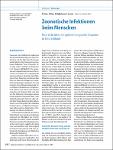Zoonotische Infektionen beim Menschen
Übersicht über die epidemiologische Situation in Deutschland
Alpers, Katharina
Stark, Klaus
Hellenbrand, Wiebke
Ammon, Andrea
Zoonosen sind Infektionskrankheiten, die auf natürlichem Weg vom Tier (Vertebraten) auf den Menschen übertragen werden können. Die Bedeutung der Zoonosen liegt in der Häufigkeit der Erkrankungsfälle, der hohen Letalität einzelner Zoonosen und der Möglichkeit von bisher auf das Tierreservoir beschränkten Erregern, die Artengrenze zum Menschen zu überwinden. Veränderte Bedingungen der Lebensmittelproduktion (inklusive Massentierhaltung) und der Ernährung sowie demographische, klimatische und ökologische Faktoren fördern die Verbreitung von Zoonoseerregern. Im Rahmen des seit 1. Januar 2001 geltenden Infektionsschutzgesetzes unterliegt Zoonoses are infectious diseases that can be transmitted from vertebrate animals to humans. Their significance lies in the large number of cases that occur, the high case fatality ratio of certain zoonoses, and the potential for some pathogens as yet restricted to animal hosts to cross the species barrier and infect humans. Changing habits in food production (for example, intensive animal husbandry) and food consumption as well as demographic, climatic, and ecological factors contribute to the spread of zoonotic pathogens. Several zoonoses are notifiable in Germany according to the Protection Against Infection Act enacted 1 January 2001. The European Commission issued a new directive on the monitoring of zoonoses and zoonotic agents on 17 November 2003. There is ongoing need to develop further measures to prevent and control zoonotic diseases on a national as well as international basis.
No license information

